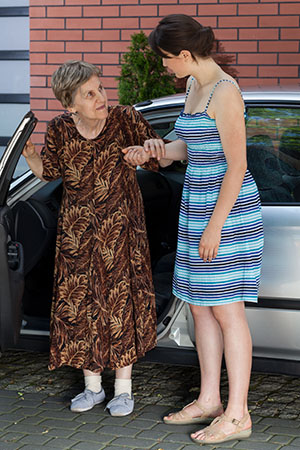How to Help an Aging Driver - Older Driver Related NC Licensing - Resources for Caregivers
General Policies
North Carolina driver’s licenses are renewed at fixed intervals. For individuals younger than 66, licenses are renewed every 8 years. For individuals 66 years and older, they are renewed every 5 years. For more information about license renewal, visit the NC DMV website.
Aside from more frequent renewals, NC DMV policies do not include any age-specific requirements or restrictions for obtaining a renewal. However, the NC DMV does have a Medical Review Unit that reviews specific cases where medical conditions may be impacting the ability of an individual to drive safely, regardless of age. Because seniors are at an increased risk of developing a medical condition that could impact driving, understanding the NC medical review process could help you know how to assist your loved one should they require a medical review.
Medical Review
Drivers of any age who may have medical or mental health concerns may be referred to the DMV for an evaluation by the Medical Review Program. This program is designed to evaluate drivers who have impairments that may interfere with their ability to drive safely. According to the NC DMV, “The goal of the Medical Review Program is to help protect highway safety without causing unnecessary hardship on drivers.”
How Referred
A Medical Evaluation is started whenever the DMV receives a request for review. These requests come from driver license examiners, family or friends, physicians, law enforcement, the court system, or as a result of a crash report where a medical condition is noted as having contributed to the crash. Requests cannot be submitted anonymously. Caregivers should consider referral for medical review only after they have exhausted other avenues for intervention. If caregivers and loved ones can agree on limiting driving or to retire from driving, then a medical review may not be necessary. Review the information in the How to Help an Aging Driver section of this website for more information on how you can work with your loved one to assess driving, promote safety, and discuss their driving.
What Drivers Can Expect
Once a request has been made, the DMV may contact the driver and request that their doctor complete a medical evaluation form. This information, along with driving history, will be used by a Medical Review Unit, made up of physicians and nurses, to determine the next steps. In some cases, the Medical Review Unit may require additional road testing or an evaluation, such as meeting with a driver rehabilitation specialist or occupational therapist. The Medical Review Unit determines what, if any, driving restriction should apply based on the unique situation of each individual. Restrictions might include limiting speed, distance, or time of day. In some cases, the Medical Review Unit may determine the person is unable to continue driving. These determinations are temporary in some cases, such as when a medical condition improves.
Periodic Reviews and Release from Program
The Medical Review Program may reassess drivers to evaluate changes in their medical conditions. The timeline for these additional evaluations depends on the individual circumstances and will be determined by the Medical Review Unit. These periodic reviews may result in continued restrictions, additional restrictions, or release from the Medical Review Program, depending on the unique set of circumstances.
If a driver’s condition is stable or has improved and they would like to be released from the Medical Review Program, they can mail a letter to the Medical Review Program requesting removal. The Medical Review Program may require updated medical documentation in order to be released.
Appeals
Drivers can appeal decisions made by the Medical Review Unit, but appeals must be made within 10 days of receipt of the Medical Review Unit decision. Drivers who request an appeal will receive an in-person hearing, where a panel of physicians will reconsider the documentation and restrictions and make a final determination. Individuals can also appeal their case to the Wake County Superior Court, if they continue to disagree with the reconsideration panel.
Visit the NC DMV Medical Review web page for more detailed information on the medical review process and for information on how to contact the Medical Review Unit.
How can you help?
- Medical Review can be an overwhelming process. Offer support and assistance in navigating the system and complying with requests for additional information
- Talk to your loved one when you have concerns about their driving. Often, families can avoid the more formal Medical Review by agreeing to limits or a decision to stop driving.
- Do not assume that your loved one needs a Medical Review simply because they’ve gotten older. Base your concerns on observations rather than age alone.



